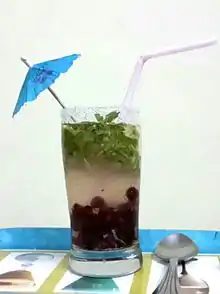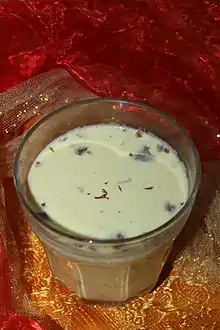List of Indian drinks
With a climate as varied and extreme as India, the people require a myriad of options to keep their thirst appropriately quenched according to the weather conditions, varying from steaming hot drinks during winters to frosty cold drinks in summers. Different regions in the country serve drinks made with an eclectic assortment of ingredients including local spices, flavors and herbs. Available on the streets, as well as on the menus of posh hotels, these drinks add to the flavorful cuisine of India.
Drinks
- Aam panna – made from raw mango
- Aamras
- Bael sharbat
- Buransh – made from rhododendron flowers with jelly like consistency, Uttarakhand
- Ela neeru / karikku - tender coconut water
- Fruit juice
- Gaajar ka doodh - made from grated carrot and sweetened milk
- Ganne ka ras or sugarcane juice
- Gud-nimbu sharbat – made of lemon and jaggery
- Jal-jeera
- Jigarthanda, famous in Madurai
- Kahwah is common drink in cold regions of Jammu and Kashmir[1]
- Kala Khatta
- Kanji
- Kesar kasturi
- Khus sharbat-made from Vetiver syrup
- Kokum sharbat
- Kulukki sharbat - Shaken Lemonade
- Liyo
- Lemonade
- Nannaari (Sarsaparilla) sharbat – lemon-based drink, Tamil Nadu
- Nariyel Pani (Coconut water)
- Neera
- Ookali – hot drink made by boiling coriander seeds, Western India
- Panakam
- Phalsa sharbat – made from Grewia asiatica
- Pudina sharbat – made from mint
- Ramula – a drink made from sweet potato
- Rasna, a soft drink concentrate
- Rooh Afza, a concentrated drink
- Sakar-loung Pani – made from rock sugar and clove; famous in Gujarat, Rajasthan
- Sattu Pani – famous in North India
- Saunf paani, from Gujarat
- Sharbat – drink that has many variants
- Shikanjvi
- Solkadhi
- Sugandha water
- Tnkaw Toraaṇi - a rice based drink from Odisha
Milk-based drinks
- Ambil or Ambli – prepared by using ragi flour and buttermilk, Maharashtra and Karnataka
- Buttermilk – "lassi" in punjab, chhachh in North India, mor in Tamil, majjiga in Telugu, majjige in Kannada, and taak in Marathi
- Chai with cream – prepared using dry or fresh variants of tea, often has hints of cardamom (elaichi), cinnamon (dalchini) or a mixture of spices, which constitute the special masala chai, taken especially during the cold to keep the winter-related problems at bay
- Haldi doodh or hot turmeric milk
- Lassi – a popular, traditional, yogurt-based drink from Punjab. It is a blend of yogurt, water, spices and sometimes fruit.
- Traditional lassi (a.k.a., "salted lassi", or simply "lassi") is a savoury drink, sometimes flavoured with ground and roasted cumin.
- Sweet lassi, however, contains sugar or fruits, instead of spices.
- Mastaani, Pune
- Sharjah Shake – A sweet, cold beverage made from Milk, Horlicks/other malt powders and njalipoovan.Sometimes, ice cream, cocoa powder or nuts may be added.
- Sambaram – Salted buttermilk made from Cow's Milk spiced with Shallot, Green Chili pepper, Ginger and Curry leaves from Kerala
- Thandai
Flavoured milk
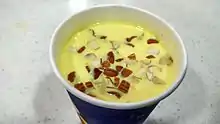
Badam milk
- Badam milk – almond-flavoured milk
- Kesar milk – saffron-flavoured milk
- Rose milk
- Sugandha milk
Tea and coffee
Coffee
- Indian filter coffee – a sweet milky coffee made from dark roasted coffee beans (70–80%) and chicory (20–30%)
- Instant coffee
Tea
- Assam tea
- Temi tea
- Darjeeling tea
- Balma green tea
- Berinag tea
- Black tea
- Green tea
- seven colour tea
- Irani chai
- Kangra tea
- Masala chai
- Noon chai
- Nilgiri tea
- Tulsi tea
- Milk tea
Flavoured tea
- Butter tea
- Elaichi tea or cardamom tea
- Ginger tea
- Lemon tea
- Tejpatta Tea
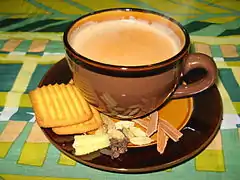 Masala chai served with tea biscuits. India's most popular way to drink tea.
Masala chai served with tea biscuits. India's most popular way to drink tea.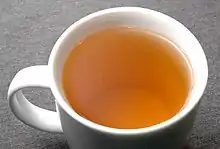 A cup of Darjeeling tea.
A cup of Darjeeling tea.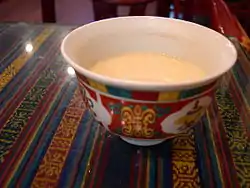 Butter tea or gur gur in the Ladakhi language, in a bowl; popular in Himalayan regions of India, particularly in Ladakh, Sikkim, and Arunachal Pradesh.
Butter tea or gur gur in the Ladakhi language, in a bowl; popular in Himalayan regions of India, particularly in Ladakh, Sikkim, and Arunachal Pradesh.
Alcoholic drinks
Traditional
 Cashew apples being squashed in Chorao, Goa, to be used in the preparation of feni.
Cashew apples being squashed in Chorao, Goa, to be used in the preparation of feni.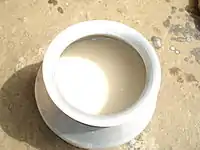 Handia is a rice beer commonly made by the indigenous people in Bihar, Jharkhand, Odisha, Madhya Pradesh and Chhattisgarh.
Handia is a rice beer commonly made by the indigenous people in Bihar, Jharkhand, Odisha, Madhya Pradesh and Chhattisgarh.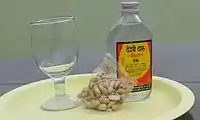 Desi daru is India's one of cheapest factory made alcoholic drinks.
Desi daru is India's one of cheapest factory made alcoholic drinks. A bottle of Bangla liquor in Chinsurah, West Bengal, India.
A bottle of Bangla liquor in Chinsurah, West Bengal, India.
- Apo – traditional drink from Arunachal Pradesh made from fermented rice
- Arrack-distilled from a wash of palm Jagger, herbs etc from Kerala
- Bangla – an alcoholic drink made from starch and sold in West Bengal. There are government licensed counters to sell this drink. This is a distilled country liquor.[2]
- Bhang lassi – an intoxicating drink prepared from the leaves and flowers (buds) of the female cannabis plant, consumed as a drink in the Indian subcontinent.
- Bitchi – a drink consumed mostly by Garo tribals
- Bhang thandai
- Chhaang or Tongba – drink from Sikkim made from grain millet
- Cholai
- Chuak – a drink from Tripura made from rice, jackfruit and pineapple
- Desi daru
- Feni – popular in Goa
- Gudamaba – a traditional drink from Hyderabad brewed from sugar cane. It used to be produced from methane and other chemicals until the government banned it.
- Handia
- Hariya
- Kaid Um – drink in Meghalaya, consumed mostly by Khasi and Jaintia tribes
- Kallu – coconut palm sap from Kerala
- Akani- Palm sap from Tamil Nadu.
- Kodo ko jaanr – also known as chyang, prepared from finger millet[3]
- Laopani (also called Haanj) – made from fermented rice; popular in Assam. Concentrated (pale yellow coloured extract) of the same is called Rohi, which is usually offered to the ancestors, priests or elders on special occasions.
- Lugdi – made from rice, Manali
- Mahua – made from mahua flowers, Central India[4]
- Mandia pej – made from ragi powder and stale water from boiled rice, popular in Odissa
- Manri – made from fermented rice, popular in Mithila
- Pendhā
- Sekmai – from the state of Manipur; made from sticky rice.
- Sonti
- Sulai
- Sunda Kanji – made from fermenting rice that is buried in earthen or mud pots covered with cloth, sold in Tamil Nadu, India.
- Sura
- Thaati Kallu
- Tharra
- Toddy/Tadi/Kallu (palm wine)
- Zawlaidi – popular in Mizoram prepared from rice, millet and maize.
- Zutho – from Nagaland
Non-Traditional
- Indian beer
- Indian brandy
- Indian-made foreign liquor
- Indian rum
- Indian vodka
- Indian whisky
- Indian wine
See also
References
- "Kashmiri Kahwa Tea Recipe: How to Make Kashmiri Kahwa Tea". recipes.timesofindia.com. Retrieved 2019-02-13.
- Tathagata Bhattacharya (23 October 2017). "Alcohol and Bengalis: A troubled relationship". National Herald.
- Tamang, Jyoti Prakash (17 August 2009). "8". Himalayan Fermented Foods: Microbiology, Nutrition, and Ethnic Values. CRC Press. p. 198. ISBN 9781420093254. Retrieved 11 August 2015.
- "Some interesting indigenous drinks among the tribals of Central India" (PDF). Indian Journal of Traditional Knowledge. 6 (1): 141–43. January 2007. Retrieved 8 February 2012.
This article is issued from Wikipedia. The text is licensed under Creative Commons - Attribution - Sharealike. Additional terms may apply for the media files.
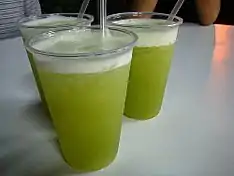
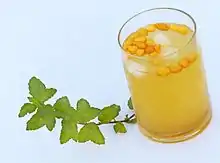
.JPG.webp)

